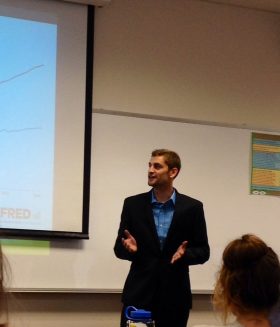Nathan Dean ’14 researched the relationship between employer-provided health insurance and wages
Nathan Dean presented his research on the relationship between healthcare costs and wages at the 2014 Duke Economics Undergraduate Research Symposium. He was one of 15 students selected from different North Carolina universities to present.

[/caption]Dean’s research paper is titled, “Do the pecuniary costs of employer-provided health insurance negatively affect labor market outcomes?”
The abstract reads:
Projections for 2014 US healthcare inflation sit at around 6.5 percent, four times greater than that of price inflation. As health insurance costs continue to increase more rapidly than wage rates, firms often respond by adjusting their employee compensation and/or their demand for labor. The hypothesized tradeoff between employer provided health insurance and wages is uncontroversial, yet puzzlingly difficult to prove. The small pool of economists that have estimated a negative relationship have used models plagued with weak instruments and omitted variable bias. More specifically, research fails to control for individual health-status, which results in a bias and overestimation of the effects of health insurance on wages. I build on previous work by adding a variable for self-reported health status. I estimate multiple two-stage-least squares models with 2009 cross-sectional data from the Survey of Income and Program Participation. By introducing health status, I find no evidence that a negative relationship exists between employer-provided health insurance and wage rates.
Dean, an economics major, conducted his research under the mentorship of Steve DeLoach, professor of economics. He also presented his paper during Elon’s Spring Undergraduate Research Forum on April 29 and at the Eastern Economic Association’s conference in March.
Dean is the recipient of the LSB Student Achievement in Economics Award, which is given to a senior economics major who has shown enthusiasm and success in his or her courses as well as promise for future achievement.


